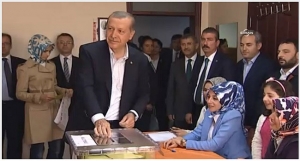
With 97 per cent of ballots counted on Sunday, the AKP had taken 40.8 per cent of the vote, according to broadcaster CNN Turk, a result which will leave it struggling to form a stable government for the first time since it came to power more than a decade ago.
“We expect a minority government and an early election,” a senior AKP official told Reuters on condition of anonymity.
The lira currency hit a record low against the dollar in thin out-of-hours dealing as investors, fearing further political uncertainty, positioned themselves for the start of trade on Monday.
The atmosphere outside the AKP’s headquarters in Ankara was muted.
Several hundred supporters chanted for Erdogan, the party’s founder, but there was little sign of the massive crowds that gathered under its balcony after past election victories.
The pro-Kurdish Peoples’ Democratic Party (HDP) was on track to take almost 13 percent of the vote, according to CNN Turk. Thousands of jubilant Kurds flooded the streets of the southeastern city of Diyarbakir, setting off fireworks and waving flags at the prospect of it clearing the threshold to enter parliament for the first time.
HDP co-leader Selahattin Demirtas ruled out a coalition with the AKP and said election results had put an end to talk of the stronger presidential powers championed by Erdogan.
“The discussion of an executive presidency and dictatorship have come to an end in Turkey,” he told a news conference in Istanbul, describing the outcome as a victory “for those who want a pluralist and civil new constitution”.
Erdogan, Turkey’s most popular modern leader but also its most divisive, had hoped for a crushing victory for the AKP, to allow it to change the constitution and create a more powerful U.S.-style presidency. To do that, it would have needed to win two-thirds of the seats in parliament.
Its failure to win an overall majority marks an end to 12 years of uninterrupted, stable single-party rule and is a setback for both Erdogan and Prime Minister Ahmet Davutoglu.
While constitutionally required as president to stay above party politics, Erdogan had held rallies throughout a confrontational campaign.
The two men portrayed the election as a choice between a “new Turkey” and a return to a history marked by short-lived coalition governments, economic instability and coups by a military whose influence Erdogan has now reined in.

